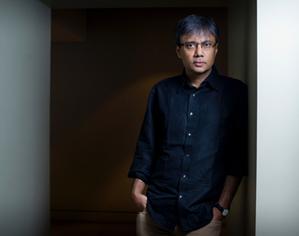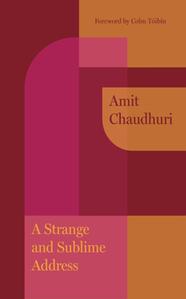
|
|
| photo: Geoff Pugh | |
Amit Chaudhuri is a novelist, essayist, poet, and musician. A fellow of the Royal Society of Literature, he lives in Calcutta and the U.K. Chaudhuri is a professor of creative writing and the director of the Centre for the Creative and the Critical at Ashoka University, as well as the editor of literaryactivism.com. He has made several recordings of Indian classical and experimental music. His first three novels, A Strange and Sublime Address, Afternoon Raag, and Freedom Song, were just reissued by New York Review Books.
On your nightstand now:
There are two books that are of interest to me at the moment--the first, Michel Chaouli's Something Speaks to Me, is a work of criticism, and I'm halfway through it. It reminds us that criticism's proper domain is outside professionalized academia, though Chaouli himself is an academic (a philosopher) and an intellectual. But it's the job, Chaouli implies (and as the departments of the humanities may have forgotten), of the intellectual and critic to find a new language with which to express love: in this case, the love of the literary and the arts.
The second book, The Savage Detectives, is a novel by Roberto Bolaño, a writer I have always warmed to for his admiration of Borges and his imperious dismissal of the Latin American "boom." I have taken a while to get round to reading this novel, partly because of my nervousness to do with the quality of the translations that Bolaño's works come to us in English; but, dipping into this tome, I find its abrasive narrative is energized by the same love I mention above.
Favorite book when you were a child:
It had to be the series by Hergé about the Mackintosh-wearing reporter Tintin (though I can't actually remember him writing or sending off a report). I loved these for the visual detail and colour--as if (it seems to me in retrospect) the tranquillity of Japanese prints had been crossed with detective fiction and adventure.
Your top five authors:
I don't have a top five: I must have admired at least a hundred writers. Having said that, I will say that D.H. Lawrence, in particular, was important, in showing me that modernism was, essentially, a way of celebrating the "here and now"; Joyce and Katherine Mansfield, for the same reasons. I also rediscovered the Calcutta street through their work, as well as a maternal uncle of mine: that rediscovery, and experience of translation, led to the writing of my first novel, A Strange and Sublime Address. V.S. Naipaul, for radically extending our idea of the realist novel by borrowing, in The Enigma of Arrival, from the essay and from autobiography; Rabindranath Tagore, for dismantling the demarcation between song, philosophy, and poetry in the lyrics of his extraordinary Bengali songs.
 Book you've faked reading:
Book you've faked reading:
A certain kind of book becomes indispensable for a particular variety of academic discourse: That's when it becomes an abstraction, and you can discuss it without having read it. You don't even to have claim you've read it; the question becomes redundant. This is an injustice to the book, of course.
There are any number of books in my room I long to read, mainly because they have titles and covers that transfix me. That's precisely why I don't get round to reading them--because I find it difficult to move forward and leave that state of being transfixed behind.
Book you're an evangelist for:
I'm an evangelist for the modernist experiment and avant-garde play to be found in literatures in the Indian languages of the late 19th and 20th centuries. Engaging with them--and their counterparts in other locations in the world (Japan, for instance)--might rescue modernism from its currently fossilized incarnation, where it's mainly available to us as European "heritage," like the paintings in the Louvre or the Eiffel Tower.
Book you've bought for the cover:
Ulysses by James Joyce. I bought it in Bombay when I was 17 largely for its giant 'U' and long, thin 'L,' for the faint pink art deco font in which the rest of the title appeared, and the uninterrupted charcoal-black background.
Book you hid from your parents:
The Godfather. I read it when I was 15: I think fellatio comes up in the first two or three pages. My father wanted to keep it and its horrors from me, but didn't want to say so--he hid it in his drawer and pretended nothing had happened. I would take it out of his drawer and read a bit every day, then put it back. When the book came up at a dinner-table conversation with a guest, I referred to its ending, and my father smiled worriedly and said, "So you've just read the first and last pages?" Strictly speaking, I didn't hide it; my father did. I only hid the fact that I was reading it.
Book that changed your life:
Sons and Lovers by D.H. Lawrence changed my life only inasmuch as it revealed to me what was important to me as a writer: not great civilizational or personal crises, but a setting aside of protagonist, story, and interiority in favour of the fact of existence. That early novel blazons the conviction he expressed (not long before he died) in his eccentric reading of the Revelations, Apocalypse: "Whatever the dead or unborn might know, they cannot know the marvel of being alive in the flesh."
Favorite line from a book:
It occurs in A House for Mr. Biswas by V.S. Naipaul, a novel about the eponymous Mr Biswas (based on Naipaul's father) who begins his life in Trinidad as a sign-painter. The three extraordinary instants of marvelling in the sentence are juxtaposed and joined to each other by the semicolon: "He thought R and S the most beautiful of Roman letters; no letter could express so many moods as R, without losing its beauty; and what could compare with the swing and rhythm of S?"

